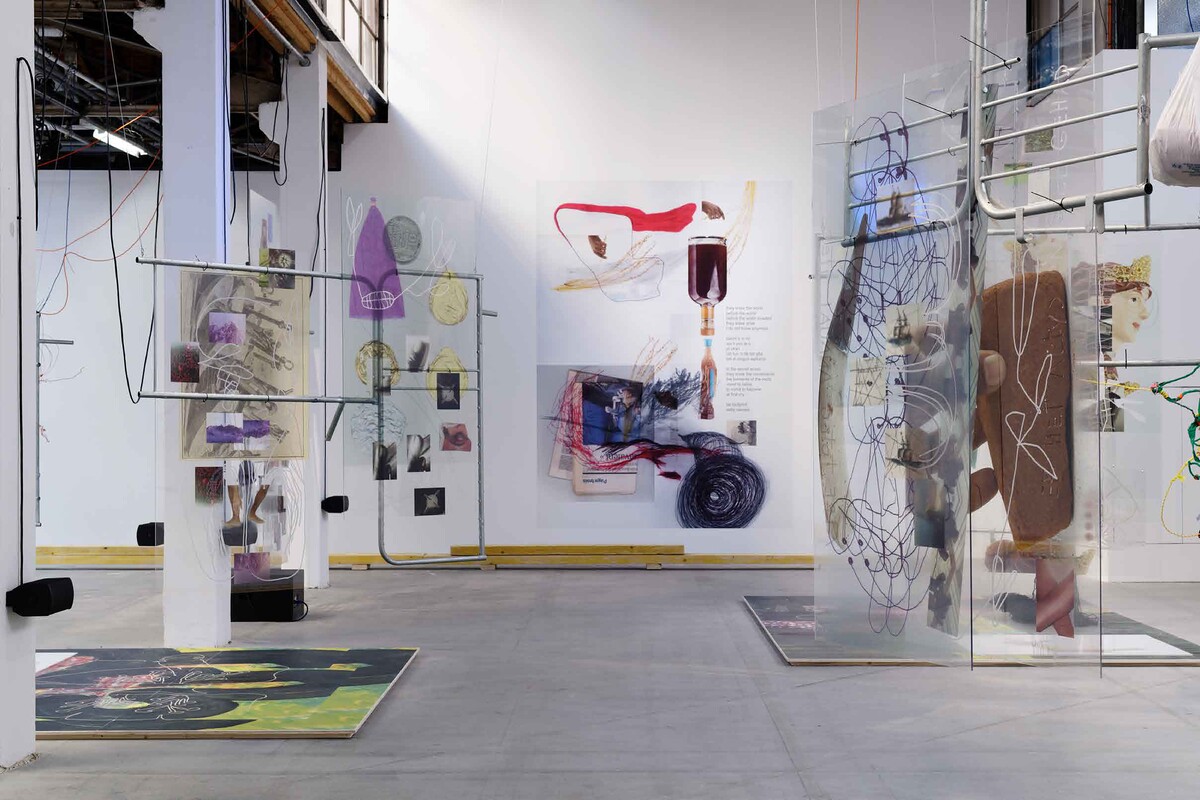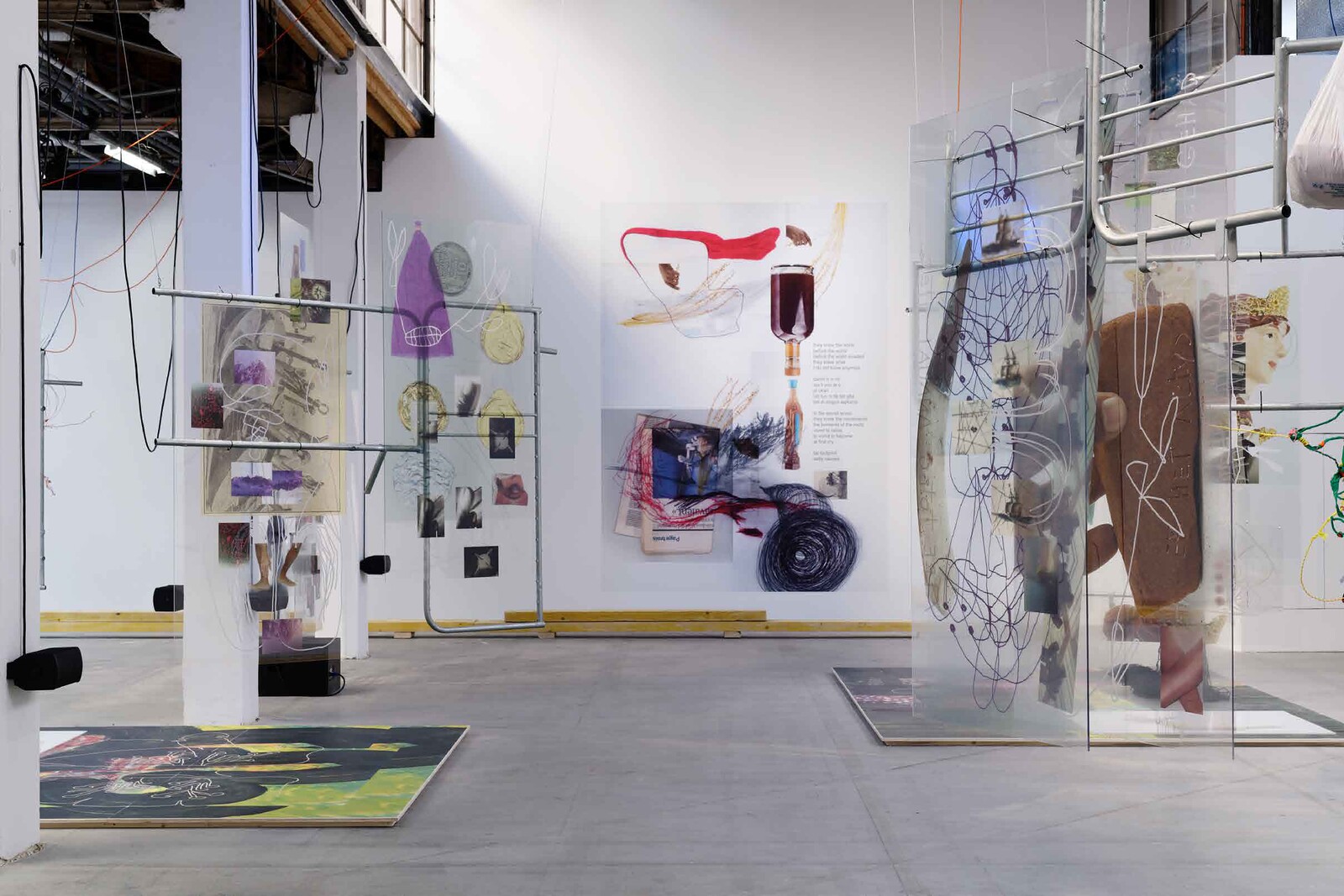Meta is a collaboration between art-agenda and TextWork, editorial platform of the Fondation Pernod Ricard, in which writers reflect on the experience of writing about art. Here, Elizabeth A. Povinelli writes of her relationship to language and considers how her essay on the work of Julien Creuzet, “In the Middle of it,” was shaped by the artist’s own approach to composition.
Language and I are not easy friends. We get along, sometimes very well, but often in a mutually irritated, strained relation. I am sure language would have her own story, but mine is this—she tends to express herself in a straight line, one element unfurling after the other, when what I sometimes want to express is the everything of something altogether in its messy material intersections. I could remind myself that in fact language operates with a spiraling multidirectional dynamic. Each word forces those already written to hold or to lose their meanings; and every word creates a virtual world of other words potentially available. Moreover, these unruly semantic dynamics are shaped by equally energetic metapragmatic dimensions. Every utterance attempts to conjure and hold a type of reality, its material contours, its legitimate actors, its values and wastelands, even as it never can fully legislate a reality because immaterial and dematerialized sedimentations, illegitimate and agnostic addressees, and unvalued and camouflaged terrains have other realities they cling to and steer like stubborn rafts in a storm-battered sea. Every piece of writing is like that raft, caught in the middle of forces whose sources one knows and cannot know.
I would have thought that language and I would reach the limits of our inextricable relationship when greeted with the work of Julien Creuzet. But the opposite happened, even though the composition of my TextWork essay was arduous. I sat with the artist’s exhibition at Palais de Tokyo before meeting him at dinner and then, a few days later, talking with him at his studio in Fontenay-sous-Bois. It was as if the outward sheen of semantic and metapragmatic textuality had been turned inside out. All the dynamics and the refusals and the constant process of reformation were chattering, moving, gluing together and slowly falling apart. The unlegislated realities, or perhaps the realities that every legislation produces, were apparent in one way, perhaps a more architectural way, in his Palais de Tokyo exhibition, and in another way in his studio. I could see a host of legible theoretical and historical texts running through and into the sculptures and videos, some he and I knew we’d mutually see, others he heard, others I heard, such as the research of my Columbia University colleague, Vanessa Agard-Jones.
In Creuzet’s work I encountered the way I experience language in its material, rowdy, and frustrated relations with other modes of expressivity. Altogether, and yet not quite hinged. Definitely framed by this, but always cracking under the strain of that. I saw Michel Serres’s little mice, heard his aching building, even as, yes, Édouard Glissant’s abyss opened as an ethical measure. But always, also, and only Creuzet and what he encounters, picks up, places against each other. How can a text, such as this now, relentlessly moving to the right until it hits the boundary of some invisible border and then suddenly veers left, not be used to displace this dynamic? Our hands used to do this work of going forward, back, and downwards. When we hit the return lever on our typewriters, the sound of a bell and crank accompanied the effort to begin a new line.
My strategy for engaging Creuzet’s exhibition, whether successful or not, was to respect his process by shaping characterization in piles of intersecting and sedimented strains. I spoke of his works that laminated together the material and discursive effects of toxic late liberal colonialism. His work emerges from detritus that he finds and that finds him but strengthens into a set of statements. His influences are Caribbean but understood as part of a localization of global climate change, capital toxicity, and struggles such as his to find alternative languages, spatiotemporalities, rehumanizations, and monstrously soothing rapports.

